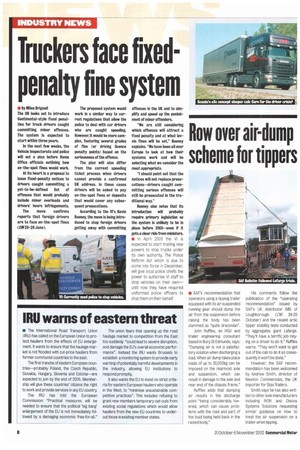Truckers face fixed penalty fine system
Page 8

If you've noticed an error in this article please click here to report it so we can fix it.
m by Miles Brignall
The UK looks set to introduce Continental-style fixed penalties for truck drivers caught committing minor offences. The system Is expected to start within three years.
In the next few weeks, the Vehicle Inspectorate and police will set a plan before Home Office officials outlining how on-the-spot fines would work.
At its heart Is a proposal to issue fixed-penalty notices to drivers caught committing a yet-to-be-defined list of offences that would probably include minor overloads and drivers hours infringements.
The move confirms reports that foreign drivers are to face on-the-spot fines (CM20-26 June). The proposed system would work in a similar way to current regulations that allow the police to deal with car drivers who are caught speeding. However, It would be more complex, featuring several grades of tine (or driving licence penalty points) based on the seriousness of the offence.
The plan will also differ from the current speeding ticket process when drivers cannot provide a confirmed UK address. In these cases drivers will be asked to pay on-the-spot fines or deposits that would cover any subsequent prosecutions.
According to the VI's Kevin Rooney, the move is being introduced to stop foreign drivers getting away with committing offences In the UK and to simplify and speed up the punishment of minor offenders.
"We are still considering which offences will attract a fixed penalty and at what levels fines will be set." Rooney explains. "We have been all over Europe to look at how their systems work and will be selecting what we consider the most appropriate.
"I should point out that the notices will not replace prosecutions—drivers caught committing serious offences will still be prosecuted in the traditional way."
Rooney also notes that its introduction will probably require primary legislation so the system Is unlikely to be in place before 2005—even if it gets a clear ride from ministers
a In April 2003 hie VI is expected to start trialling new powers to stop trucks under its own authority The Police Reform Act which is due to come into force in December, will give local police chiefs the power to authorise VI staff to stop vehicles on their own— until now they have required uniformed police officers to stop them on their behalf.




























































































































































